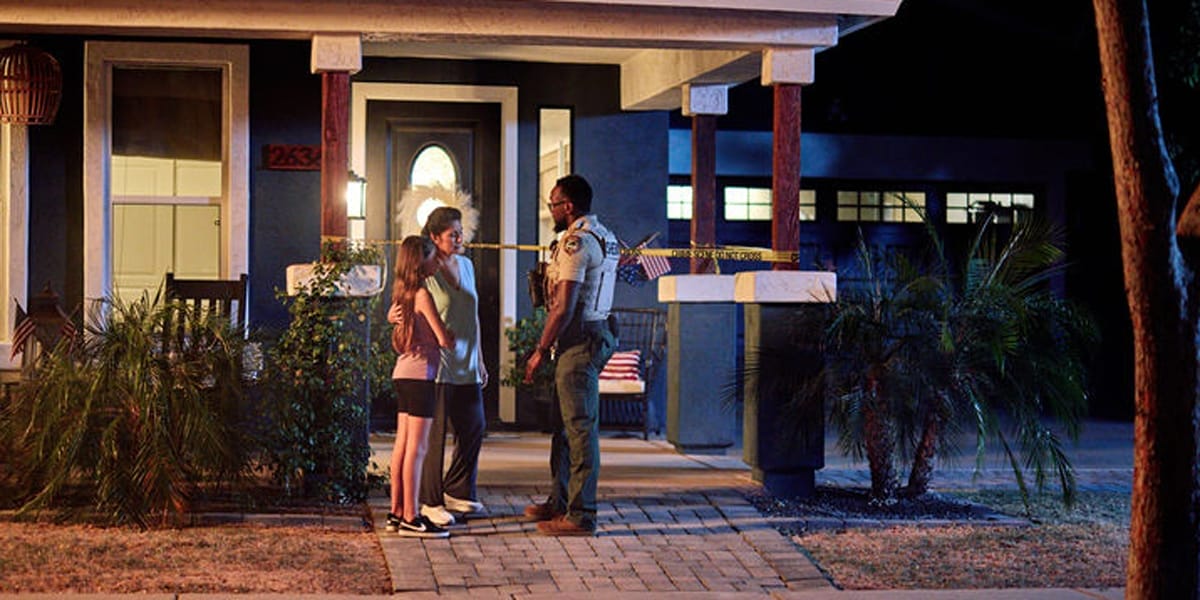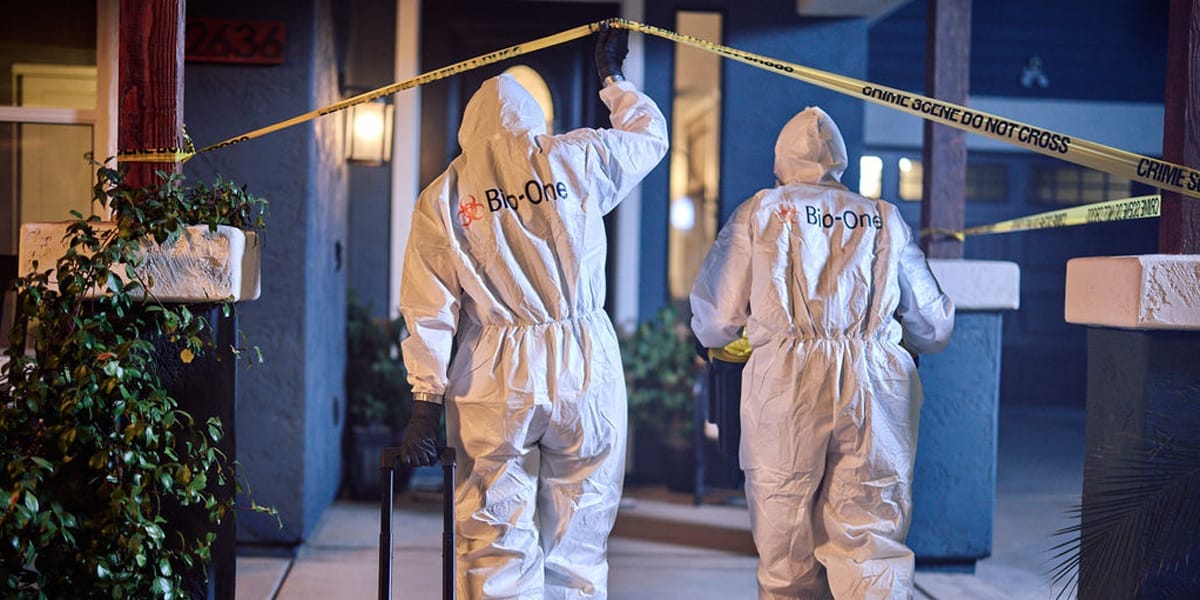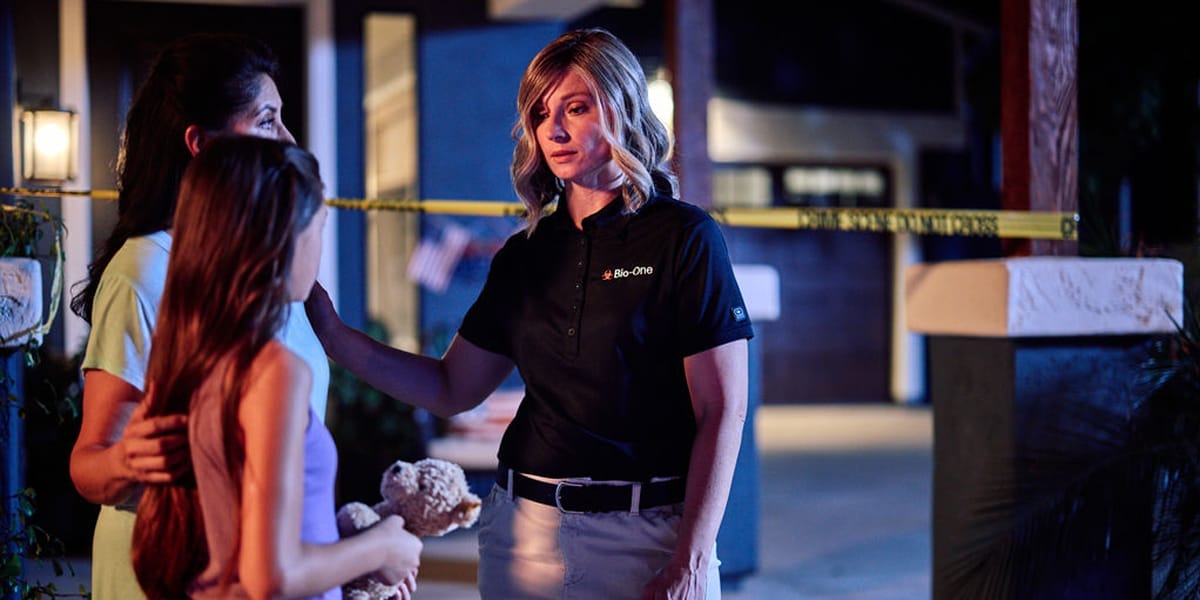When tragedy strikes, families are left carrying a weight that goes far beyond the incident itself. A crime scene isn’t just about what happened—it’s about what’s left behind. For families, returning to that space can be overwhelming. It’s a reminder of loss, fear, and pain at the very moment when what they need most is comfort and support.
Yet in the middle of grief, families quickly learn something few expect: the responsibility for cleanup doesn’t fall to the police, the city, or investigators. It falls to them.
That realization can be crushing. The good news is, no one has to face this burden alone. Professional crime scene cleanup isn’t just about restoring a property—it’s about helping families take the first step toward healing.

____________________________
When the unthinkable happens, the last thing families should have to worry about is how to clean up the aftermath.
____________________________
Every family’s experience is unique, but the emotional impact of encountering a crime scene often follows the same painful threads:
For many families, the hardest part is the sense of being alone in this process. They didn’t choose to be in this situation, and yet the responsibility for restoring their home now rests on their shoulders.
____________________________
Did You Know?
Research has shown that when people are repeatedly exposed to trauma reminders in their living environment, symptoms of grief and post-traumatic stress disorder (PTSD) can last longer and become more severe.
____________________________
Who Handles Crime Scene Cleanup?
After investigators finish their work, who is responsible for cleaning a crime scene?
Answer: C Most families are surprised—and overwhelmed—to learn that the responsibility for cleanup falls on them.
____________________________
It might be tempting to think of crime scene cleanup as just another form of “deep cleaning.” But the truth is, it’s far more than that.
A crime scene carries both emotional weight and physical danger. Stains or remnants aren’t just unpleasant—they are vivid reminders of trauma. Even after hours of scrubbing, families may feel their space has been permanently changed.
Without proper remediation, emotional healing can stall. Families deserve to reclaim their homes without being constantly reminded of what happened there.
Imagine walking into your living room after a traumatic event. The carpets look clean, but you notice faint stains or an odor that lingers. Do you feel comforted—or do you feel the weight of what happened, all over again?
This is why professional restoration matters. It’s not just about appearance—it’s about peace of mind.

While the emotional toll of a crime scene is often the most visible, there are also unseen dangers that linger long after the incident. These risks don’t always appear on the surface, which can create a false sense of security if cleanup is attempted without professional assistance.
Blood and bodily fluids may appear as stains, but they can pose serious health risks. Viruses such as HIV, Hepatitis B, and MRSA are known to survive outside the body for hours, days, or even longer, depending on the conditions.
Exposure isn’t limited to direct contact—microscopic droplets or residue on surfaces can also spread disease if touched or aerosolized during cleaning. Without the proper protective equipment and disinfectants, anyone attempting to clean the scene risks infection.
What families often don’t realize is how quickly fluids can seep into porous materials like wood, carpet, drywall, or subflooring. Even when a surface looks clean, contaminants may have traveled deeper, where bacteria thrive unseen. Over time, this can lead to:
In some cases, entire sections of flooring, furniture, or drywall must be removed and replaced to ensure the home is truly safe.
Odors are more than an inconvenience—they are a sign that microscopic contaminants are still present. The smell of blood, decomposition, or other biohazards can cling to fabrics, penetrate HVAC systems, and reappear long after the space seems “clean.”
These odors not only retraumatize families but also signal ongoing health risks if the underlying contamination has not been entirely removed.
Standard household cleaners and DIY efforts are insufficient to eliminate these dangers. Specialized tools—such as ozone machines, ATP testing (to verify sanitation), and EPA-registered disinfectants—are required to restore the environment safely.
Professional remediation doesn’t just clean what’s visible; it addresses the hidden layers of contamination to ensure the home is safe, stable, and livable once again.
____________________________
Did You Know?
Biohazard materials can penetrate surfaces like wood and drywall within minutes. Even if a surface appears clean, harmful bacteria may remain hidden, posing ongoing health risks and potentially causing costly property damage if left untreated.
____________________________

When tragedy strikes, cleanup is never just about sanitizing a space—it’s about helping families start the recovery process. Professional crime scene cleanup goes beyond surface-level cleaning to restore health, safety, and dignity.
Professionals don’t just wipe down visible surfaces. They utilize advanced remediation techniques, including ATP testing to confirm sanitation, medical-grade disinfectants, and specialized equipment that penetrates deep into porous materials where contaminants may hide.
Odor neutralization systems, air filtration, and biohazard disposal protocols ensure the space is genuinely safe and habitable again.
This level of restoration allows families to step back into their homes without fear or hesitation. Instead of seeing reminders of what happened, they see a clean, stable environment where healing can begin.
A crime scene isn’t just physically hazardous—it’s also deeply personal. The presence of marked vans, large crews, or public attention can add unnecessary shame or stress to an already painful time.
That’s why professional cleanup companies prioritize discretion. From arriving in unmarked vehicles to working quietly behind closed doors, their goal is to protect the family’s privacy and dignity at every step.
Neighbors don’t need to know, and families don’t need to feel exposed.
This respectful approach creates space for loved ones to grieve without added pressure or embarrassment.
Technical training matters, but so does the human element. The best cleanup professionals understand they are stepping into a family’s darkest hour. Every word, every action, is guided by empathy as much as expertise.
That compassion shows up in small but meaningful ways:
For many families, this combination of professional skill and personal compassion makes all the difference. Cleanup isn’t just about removing hazards—it’s about helping people take the very first step toward healing.
____________________________
When Families Should Call a Professional
If any of these apply, professional help is the safest path forward.
____________________________
While emotional support and compassion are at the heart of professional cleanup, the practical relief it brings to families can’t be overstated.
In moments of crisis, even simple logistics can feel overwhelming. By stepping in, professionals assume the responsibility that families should never have to bear alone.
At the top of the list is protection from hidden hazards. Professional cleanup ensures that all bloodborne pathogens, bodily fluids, and contaminated materials are entirely removed—not just from visible surfaces, but from flooring, walls, and air systems.
This prevents the spread of illness, mold, and bacteria that can threaten residents long after the initial incident. Families gain peace of mind knowing their home is not only clean, but safe to live in again.
Navigating insurance paperwork is the last thing grieving families want to deal with, yet it’s often a necessary step in covering cleanup costs. Professional companies like Bio-One routinely help with this process. They provide detailed documentation, photos, and reports required for claims and even communicate directly with adjusters when needed.
This kind of support can reduce financial stress and eliminate the confusion of trying to figure out coverage alone—saving families both time and worry.
Perhaps the most valuable gift of all is freedom from the burden of having to do it themselves. Without professional help, families might feel pressure to handle cleanup personally or to assign the task to friends, property staff, or maintenance crews.
Not only is that unsafe, but it also adds another layer of emotional strain to an already devastating situation.
Professional cleanup teams lift that weight off families’ shoulders. They manage the logistics, disposal, labor, and details—so families can focus entirely on what truly matters: grieving, remembering, and beginning to heal.
____________________________
Did You Know?
Many homeowners’ insurance policies cover crime scene cleanup. Families often don’t realize this, and it can significantly reduce the financial burden.
____________________________
For families, cleanup is often the first real step toward moving forward. It takes the space of trauma and restores it into a place where life can begin again.
It doesn’t erase what happened, but it creates the foundation for healing—without the constant physical reminders that might otherwise prolong the pain.
At Bio-One, our mission has always been Help First, Business Second. That means putting people and healing at the center of every service we provide.
____________________________
Pause & Reflect:
If someone you loved went through a tragedy, how would it feel to know that professionals could quietly remove the burden of cleanup—so you could focus on what matters most?
____________________________
A crime scene leaves more than physical damage—it leaves emotional wounds that take time to heal. Professional cleanup is not just about restoring a property; it’s about easing the weight families carry and creating space for recovery.
If you or someone you know is faced with the unimaginable, remember: you don’t have to handle it alone. Bio-One of Duval County is here to provide compassionate, professional help when it matters most.
October is recognized nationwide as National Crime Prevention Month, a time when communities, law enforcement, and organizations come together to raise awareness and share strategies for reducing crime.
While no one can prepare for every situation, taking small, consistent steps can make homes and neighborhoods safer.
Here are a few ways families and communities can take part:
Personal Awareness
By combining awareness, preparedness, and community support, we can all play a part in preventing crime and creating safer places to live, work, and heal.
Cleanup is not handled by law enforcement or the city. It falls to the property owner or family, which is why professional help is often essential.
Crime scenes can contain hidden dangers like bloodborne pathogens, structural damage, and lingering odors. Without proper equipment and training, cleanup can compromise health, safety, and emotional well-being.
Blood and bodily fluids can carry viruses such as HIV, Hepatitis B, and MRSA. Even when stains aren’t visible, harmful bacteria may remain in flooring, walls, or fabrics.
Restoring the home to a safe, clean condition removes painful reminders of trauma. It creates a supportive environment where families can grieve, remember, and eventually move forward.
Professional cleanup companies, like Bio-One, often arrive in unmarked vehicles and work quietly to protect your privacy and dignity.
In many cases, yes. Homeowners’ insurance often covers the cost of professional biohazard cleanup. Cleanup companies can help with documentation and communication with adjusters.
Ordinary household cleaners can’t fully remove biohazards. Professionals utilize advanced tools, including ATP testing, medical-grade disinfectants, and odor neutralization systems, to ensure the environment is completely safe.
Depending on the virus and conditions, pathogens can survive for hours, days, or longer. That’s why professional remediation is critical, even if a surface looks clean.
Keep people and pets out of the area, avoid touching or attempting to clean, and call a certified crime scene cleanup professional as soon as possible.
National organizations like NOVA (https://trynova.org), OVC (https://ovc.ojp.gov ), and VictimConnect (https://victimconnect.org) offer advocacy, resources, and confidential support services.

The roots of crime- and trauma-scene cleaning companies can be traced to the 1990s, and at that time only a dozen or so companies existed. The industry was widely unregulated and awareness of contamination risks were relatively non-existant.
"I was young and dumb and saw something you only see in movies, so I quickly shut the door, took a deep breath, sat on the couch with the widow and told everyone else to get her out of here and take her to lunch, and we’ll clean this up for her," said Nick-Anthony Zamucen, Founder of Bio-One Inc. "We were just trying to help a lady in her greatest time of need, and that’s for me how I got into the crime scene and cleaning business." Read Nick's story in Franchise Times.
Today, there are hundreds of companies that advertise crime and trauma scene cleaning, and a simple Google search may prove overwhelming when you're experiencing one of the most traumatic moments in your life. To help, we've listed pre-qualifying questions to ask before choosing a crime and trauma scene company.
Questions to Ask Before Hiring a Crime and Trauma Scene Cleaner
There are a number of key questions to ask crime and trauma scene cleaning technicians or business owners to properly root out which one is best for your goals and circumstances.
Last but certainly most important, make sure the business you speak with shows care and compassion for your situation. They should want to do everything possible to support you and your loved ones.
If you are searching for a crime and trauma scene cleaner, Bio-One is here for you. All of our offices adhere to our business motto Help First, Business Second and are available 24/7. Click here to search for a Bio-One team near you.

Bio-One teams across the U.S. answer calls to help their communities and remediate a variety of scenes. In our new blog series, we'd like to bring you into the Bio-One world by sharing stories of the unique and important work we do for local communities.
Here is Week 7 of our Bio-One Weekly Wrap-Up.
Thank You to the Thin Gold Line
The second week of April is a time to celebrate and thank telecommunications professionals who dedicate their lives to serving the public. Often called the thin gold line, 911 dispatchers are true heroes behind the scenes.
Coast to coast, Bio-One teams found fun and unique ways to recognize the Thin Gold Line.
Bio-One Helps Homeless Man with Vehicle Clean Up
This week, News San Diego reported "Homeless man's story inspires San Diego mom to enlist community's help", featuring Rene Flohr and Nicki Chipp-Flohr, owners of Bio-One. The Bio-One duo spotted a NextDoor post asking for anyone who could help 79 year-old, Les, who had been living out of his vehicle and was recently diagnosed with skin cancer. His vehicle was floor to ceiling full of items, and Bio-One was ready to help clean and disinfect the vehicle so it could be sold or donated.
In a message to Bio-One owners, Nicki said, "I am very proud of what we are doing to help someone. I thought you’d all appreciate it, since we live the Bio-One motto of #helpfirstbusinesssecond." We couldn't agree more!
Read the entire story on News San Diego.
A "Week in the Life" at Bio-One
The Bio-One team in Tuscon, AZ had a busy week with work ranging from COVID-19 disinfections, mold remediations, bird dropping clean up, medical waste disposal, suicide remediation, and more.
If you've ever wondered what it takes to be a crime and trauma scene cleaner, we recommend read through the Tuscon team's Weekly Wrap-Up!


Bio-One teams across the U.S. answer calls to help their communities and remediate a variety of scenes. In our new blog series, we'd like to bring you into the Bio-One world by sharing stories of the unique and important work we do for local communities.
Here is Week 6 of our Bio-One Weekly Wrap-Up.
Cherokee County Biohazard Remediation
Lives in the Atlanta area were forever altered on Tuesday, March 16, 2021 after a shooting spree at three metro Atlanta spas left eight people, including six Asian women, dead within the span of 45 minutes.
Our hearts and sympathies are with everyone impacted by this tragedy.
Two weeks after the tragic events in Atlanta took place, Bio-One answered the call to remediate the spa in Cherokee County. Led by Michele O'Brien and Rebecca Phillips, the Bio-One team provided a quick response and thorough decontamination. Read more in our recent blog post.

Tragedy in Rock Hill, South Carolina
As details from the tragedy in Rock Hill, South Carolina unfold, one Bio-One team paid special tribute to the victims, first responders and other local law enforcement officials. Bio-One owners, John and Jen Symons, live in Rock Hill and experienced the police response first-hand. "It's a tight-knit community. We just can't believe it," said Jen Symons.
Their team is currently in communication with local law enforcement, and activity supporting neighbors through this difficult time.
COVID-19 Disinfection at Dojo
This week, we're spotlighting the Atlantic City team where they are regularly disinfecting Ganguly's Mixed Martial Arts. According to Bio-One owner, Victor Russomanno, "We are contracted with a local martial arts studio to disinfect them weekly. In addition to their in-house protocol, we use an electrostatic sprayer to ensure maximum coverage and protection, to ensure those who are training are staying safe through our efforts."
Across the United States, Bio-One teams actively disinfect local businesses, government buildings, and residents in the fight against coronavirus. Learn more about our COVID-19 disinfection process.